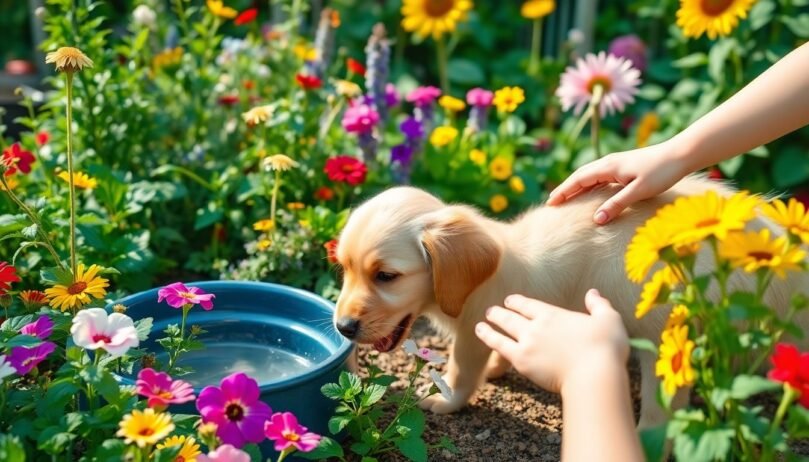Creating a Dog-Friendly Garden
- 27 December 2024
- BuyAPet Editorial Team
- All Dogs
Create a Dog‑Friendly Garden: Safe Plants, Play Zones & Water Tips
Design a backyard that looks great and works for dogs—safe plants, secure fencing, comfy shade, enrichment features, and easy‑care hydration all included.
Choosing the Right Plants
Toxic plants to avoid
- Lilies (especially dangerous to cats)
- Sago palm
- Foxglove
Dog‑friendly alternatives
- Marigolds and sunflowers
- Herbs like basil
Fencing & Security
- Match fence height and strength to breed (small: ~4 ft; large/athletic: 6 ft+).
- Install secure, self‑closing gates; mount latches high.
- Choose styles to suit your garden (wood panels for privacy; chain link for visibility).
Designing for Comfort & Play
Play areas
Dedicate a soft‑surface zone (e.g., grass or rubber mulch) sized for your dog’s zoomies.
Shade & shelter
Plant trees or add a pergola; provide a dog house or covered patio for naps.
Enrichment
Place tunnels, ramps, and scatter durable toys to keep curiosity high.
Water Features & Hydration
- Use a heavy, wide bowl or a dog‑friendly fountain; keep near play zones.
- Change water daily and scrub bowls/fountains to prevent slime and algae.
Maintenance & Seasonal Tweaks
- Prefer organic lawn care; hand‑pull weeds where possible.
- Pick up waste promptly with biodegradable bags.
- Summer: add shade and water options. Winter: choose paw‑friendly surfaces and de‑icers.
FAQs
Which plants are safest for dogs?
Marigolds, sunflowers and many kitchen herbs (like basil) are generally considered dog‑friendly.
How tall should my fence be?
Small breeds often do fine with ~4 ft, while athletic or large breeds typically need 6 ft or higher.
What surface is best for play?
Soft grass or rubber mulch cushions joints and reduces slips compared with hard stone.
How often should I clean water bowls?
Rinse daily and scrub several times per week to prevent biofilm and algae.
This article is educational and not a substitute for professional veterinary advice. For persistent issues or medical concerns, consult your veterinarian.
